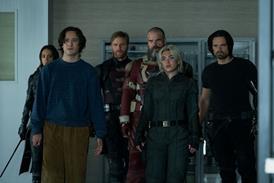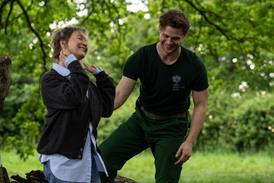Ralf Huettner’s Vincent Wants To Sea (Vincent Will Meer) picked up the Golden Lola for best feature film at this year’s German Film Awards in Berlin. Tom Tykwer’s Three (pictured) was the big favourite heading into the awards but missed out on best film and had to settle for three prizes including direction.
The feelgood comedy about a young man with Tourette’s syndrome, which had been written by actor Florian David Fitz, also attracted the Lola for leading actor for Fitz, who is now preparing his directorial debut Jesus Liebt Mich for UFA Cinema to begin shooting next month. The production will also star Jessica Schwarz, Hannelore Elsner and Henry Hubchen.
Tykwer’s Three (Drei) had earned six Lola nominations and missed out on feature film honours – much to the chagrin of producer X-Filme Creative Pool and, in keeping with all things being in threes, ended the evening with three trophies: for direction, editing and leading actress (for Sophie Rois).
Other popular winners included three films which had their world premieres during this year’s Berlinale. Wim Wenders’ 3D dance documentary Pina took home the Lola for documentary, while Andres Veiel’s fiction feature debut If Not Us, Who(Wer Wenn Nicht Wir) received the Bronze Lola for best film. In addition, members of the German Film Academy voted to give Yasemin Samdereli’s comedy Almanya (Almanya– Willkommen In Deutschland) the Lola for screenplay and the Silver Lola for best feature film.
Although not nominated in the feature film category, Chris Kraus’ historical drama The Poll Diaries( Poll) set on the eve of the First World War nevertheless continued its successful spate of awards at home and abroad by receiving four of the craft Lolas – for supporting actor, cinematography, costume design and production design. Another of the recent international festival favourites, Florian Cossen’s feature debut The Day I Was Not Born (Das Lied In Mir) was recognised with Lolas for music score and supporting actress, the latter distinction being accepted in person by Argentinian actress Beatriz Spelzini who had made the long journey to Berlin for the awards ceremony.
Meanwhile, Arne Birkenstock’s Chandani Und Ihr Elefant beat off daunting competition from the 3D animation film Animals United (Konferenz Der Tiere) to win the Lola for children’s film.
A particularly emotional highlight was the presentation of the German Film Academy’s Honorary Award to the veteran screenwriter Wolfgang Kohlhaase who was joined on stage by four actors – Nadja Uhl, Renate Krossner, Andreas Schmidt and Henry Hubchen - who had appeared in films such as Solo Sunny and Summer In Berlin based on screenplays written by Kohlhaase.
With hardly two months having passed since the untimely passing of Bernd Eichinger in Los Angeles in January, the loss for German cinema was palpable during the awards ceremony.
In his speech, minister Neumann recalled how Eichinger had been “visibly moved” on being presented with the honorary award last year. “At the time, I thought this is actually much too early because his life’s work seemed to be far from being finished,” Neumann said.
Now, in retrospect, Neumann said that he was pleased that the German film community had been able to celebrate “the dauntless and sensitive exceptional producer with his burning passion for German cinema.”
Later in the ceremony Iris Berben, joint president of the German Film Academy, announced that a new Lola prize category would be introduced from 2012 with the creation of the Bernd Eichinger Prize, to be voted on by the Academy’s entire 1,200-strong membership.
Initiated by his widow Katja and daughter Nina, the prize will be presented every three years and aims to “honour personalities or teams whose work is distinguished by creative and passionate interaction.”
Celebrating its 61st jubilee this year, the German film industry’s annual bash – which sees more than €2.85m in prize-money being distributed to 16 prize categories – was held in Berlin’s Friedrichstadtpalast before an audience of 1,800 guests, including State Minister For Culture Bernd Neumann, boxing champion Vladimir Klitschko, producers Artur “Atze” Brauner, Martin Moszkowicz, Maria Kopf, Rainer Kolmel, actors Heike Makatsch, Karoline Herfurth, Henry Hubchen, Christiane Paul, and Sibel Kekilli, directors Tom Tykwer, Wim Wenders, Detlev Buck, Marco Kreuzpaintner and Oskar Rohler.
Meanwhile, at an event hosted by the conservative CDU and CSU parties ahead of the Film Awards, leading CDU politician Volker Kauder said that during forthcoming discussions on the German government’s mid-term financial framework he would be calling for the German Federal Film Fund (DFFF) to continue to receive its annual budget of €60m per year for 2013-2015.
Neumann added in his speech that a number of “critical questions” would be posed particularly in connection with the DFFF’s evaluation: “For example, is our funding leading to many films which are taking the spectators away from each other? Should the support of big productions be greater at the expense of the others? Are we doing enough for especially innovative and creative films? Is the success at the box office too little in the field of vision?”
“Everything shouldn’t stay as it is – we need changes!” Neumann added. “But I am dead-set on not reducing the resources for film funding despite a drastic need to economise in the federal budget; they are indispensible for the competitiveness of the German film industry.”
The complete list of prize-winners can be found at www.deutscherfilmpreis.de
































No comments yet